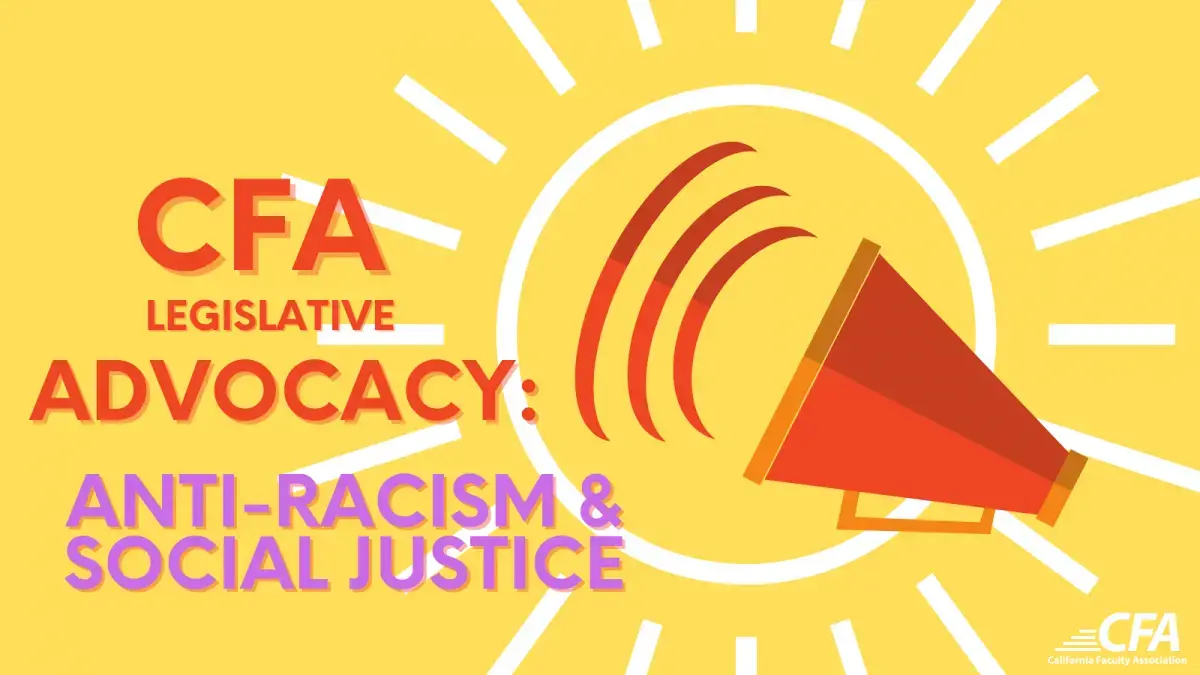CFA Backs Anti-Racism and Social Justice Bills
Last week, we reviewed bills that protect and strengthen higher education and enhance student access.
Throughout the coming weeks, CFA will introduce members to various proposed legislation that CFA either supports or is closely watching. These bills received input from chapters, were recommended by CFA’s Political Action and Legislative Committee, and were ultimately approved by the CFA Board of Directors.

This week, CFA unveils 22 bills that align with our anti-racism and social justice work. This legislation would implement reform of immigration support services, steer grant funds toward community-based responses for emergencies affecting vulnerable populations, expand birth control access, and create a single-payer healthcare plan.
“As an organization committed to doing something about structural and systemic racism and working toward a more racially and socially equitable society, CFA is excited to support the following pending legislation,” said Steven Filling, CFA Political Action and Legislation Chair. “We firmly believe that legislation can be a mechanism for societal change.
“Working with legislators to draft and perfect bills that reflect and implement our core values is a privilege and enables our union to not only envision a better society but also to assist in implementing that shared vision.”
Unless specifically noted, CFA supports these legislative efforts.
Assembly Bill 47: CFA is watching this bill before taking a position. AB 47 would create multi-tiered and coordinated immigration support services to children and families separated at the border due to the Trump Administration’s “zero tolerance” immigration policy.
AB 105: We are watching this bill as we continue discussions with our members. Also known as the Upward Mobility Act, AB 105 would reform public sector processes that currently hinder mobility for people of color in civil services.
AB 118: creates the CRISES ACT, a pilot grant program to expand community-based responses to local emergencies affecting vulnerable populations. The funding would help in public health, unhoused, mental health, partner or community violence, substance-use disorder, and natural or climate disaster crises, and replaces the need for law enforcement.
AB 123: redefines existing law to ensure California’s Paid Family Leave program guarantees workers on leave 90 percent of their income, up from 60 to 70 percent currently, for a maximum of eight weeks.
AB 600: makes it a hate crime to attack someone based on their immigration status.
AB 1096: eliminates the term “alien,” which is used to describe foreign-born individuals.
AB 1400: creates a single-payer health system called CalCare, which would expand coverage to nearly 3 million uninsured Californians and provide dental care, prescription drug coverage, and long-term care.
Senate Bill 2: creates a statewide decertification process to revoke the certification of a peace officer following the conviction of serious crimes or termination from employment due to misconduct.
SB 17: calls on the state to declare racism a public health crisis and to enact state policies to address systemic and institutional racism leading to poorer health in communities of color.
SB 523: Known as the Contraceptive Equity Act of 2021, this bill expands and modernizes California’s birth control laws.
SB 737: authorizes the Student Aid Commission to allocate funds under the Student Opportunity and Access Program for projects designed to increase accessibility of postsecondary educational opportunities and financial aid to those in underserved communities who meet specified criteria.
Senate Joint Resolution 1: urges the U.S. President to cancel $50,000 in student loan debt per borrower.
In addition to our support bills, CFA currently opposes SB 249. CFA believes that adding “political affiliation” to the list of protected characteristics in state anti-discrimination statutes is a clearly partisan solution in search of a problem. Likewise, requiring state and local agencies to investigate spurious complaints is a waste of valuable time and resources. Despite accusations, there is no evidence that political affiliation is a factor in decisions on student financial aid awards, nor is there credible evidence of harassment or bullying based on political affiliation.
Join California Faculty Association
Join thousands of instructional faculty, librarians, counselors, and coaches to protect academic freedom, faculty rights, safe workplaces, higher education, student learning, and fight for racial and social justice.